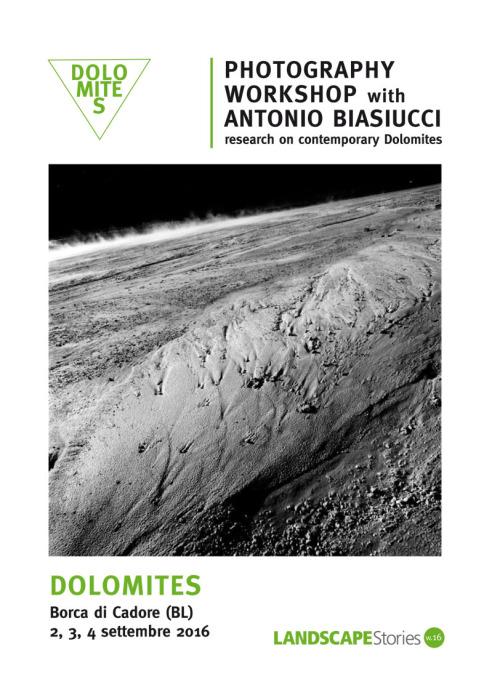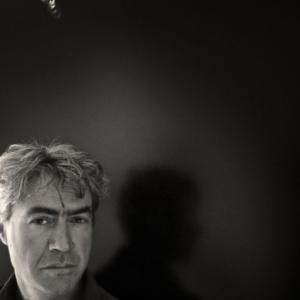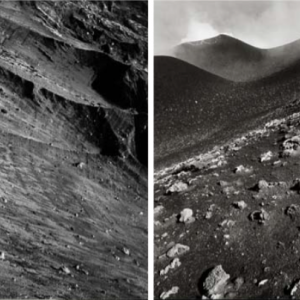2, 3, 4 september 2016
PROJECT
During the day’s workshop we will devote to the photographic observation of the Dolomiti territory, of its forms and history. Identity, document, traces sedimentation.
Meditations about the cultural concept of nature and landscape, genius loci, marks of anthropization of the places. The organisation of the photographic storytelling (preparation of the shot, the selection of the point of view and the framing, considerations about the process, time and method…).
The workshop resolves to supply the participants with the methodological and conceptual instruments necessary for the reflection on the sense of photography, with regard to photograph, why and somehow. A fundamental part will be to try not to photograph vainly, even not to photograph at all or to do it by a new aptitude and coscience of his own choice and language. The partakers will be promoted to stop themselves before photographing, to do it proving to belie their customs and hoping to bait new ways and reflections. The programme is articulated in three days in which the subscribers will have the possibility to acquaint continuosly with Antonio Biasiucci. The will is also to borrow the photographic practice, often individual and solitary, in a shared instrument of relation and construction. Not only unidirectional expression of a row of contents from the teacher, but also opportunity of dialogue and constructive criticism. The object is grammatical and sensitive as to oneself, to the photograph and at last to the surrounding landscape. The possibility to produce new images can be confronted whether using analogic or digital cameras.
A selection of some images of every single subscriber will be published in a dedicated section into the magazine of contemporary photography Landscape Stories.
TEACHER
Antonio Biasiucci was born in Dragoni, in the province of Caserta (Italy), in 1961. In 1980 he moved to Naples, where he initiated a project on spaces in the city’s outskirts and at the same time he started investigating personal memory, photographing rituals, the envoironment and people in his native village.
1984 marked the beginning of a collaboration with the Vesuvius Observatory, during which he carried out an extensive survey of Italy’s active volcanoes. In 1987 he met Antonio Neiwiller, an actor and theater director, and two would continue to collaborate closely until 1993, the year in which Neiwiller died. Right from the beginning. Biasiucci’s investigation war rooted in the there of the culture of Italy’s Mezzogiorno, and in recent years has turned into a journey throught the primary elements of existence. He has been the recipient of many awards, including the European Kodak Panorama Prize at Arles in 1992; the Kraszna/ Krausz Photography Book Award in 2005, for his book Res. Lo stato delle cose (2004) and, in the same year, the Bastianelli Prize. He has had numerous solo exhibitions and partecipated in collective shows, festivals and fairs both in Italy and abroad. He has also collaborated on many different editorial projects and participated in major cultural initiatives focused on social issues. Biasucci was among the artists selected to exhibit in the Italian Pavillon at the Venice Biennale in 2015. Many of his works are to be found in the permanent collections of museums and institutions, both in Italy and abroad, including: National Institute for graphics, Rome; MAXXI, Rome; PAN Palazzo delle Arti, Naples; MADRE – Museo d’Arte Contemporanea Donna Regina, Naples; Metropolitana of Naples, Galleria Civica di Modena; Museum of Contemporary Photography Villa Ghirlanda, Cinisello Balsamo (Milan), Peggy Guggenheim Collection, Venice; Fondazione Sandretto Re Rebaudengo for Contemporary Art, Guarene (Cuneo); Fondazione Banco of Naples; Unicredit Bank Collection, Bologna; Bibliothèque nationale de France, Paris; Maison Européenne de la Photographie, Paris; Château d’Eau, Toulouse; Musée de l’Elysée, Lausanne; Centre de la Photographie, Geneva; Fondazione Banca del Gottardo, Lugano; Centre Méditerranéen de la Photographie, Bastia; Galerie Freihausgasse, Villach (Austria); Departamento de Investigación y Documentación de la Cultura Audiovisual, Puebla (Mexico); Pio Monte della Misericordia, Naples; Mart, Museo d’Arte Moderna e Contemporanea di Trento e Rovereto, Rovereto.
www.antoniobiasiucci.it
LOCATION
The place of our choice for this workshop is Borca di Cadore (Belluno, Dolomiti Mountains), a few steps from Cortina d’Ampezzo (13km), in the Village Corte delle Dolomiti (ex ENI Village), which rises between the Monte Antelao and the majestic proportion of the Monte Pelmo, at about 1000-1200 metres in height. The region of Borca di Cadore is a mountain landscape with spectacular nature, less known are the mountains of the neighbouring “Perla delle Dolomiti”, but as much, also more, amazing as landscapes and on which we should like to accomplish a photographic research deepens. The territory of the Dolomiti became in 2009 Unesco cultural heritage. The touristic Village of Corte took shape in the fties-sixties of Enrico Mattei will, charismatic and volcanic president of ENI. Destined to an solida resort for the staff of the rm, it assumed a shape at the same time as a project precursor of the environmentalist sensibility emerged in a more evident manner in the eighties and as expression of architectural conception innovative able to annul “every link between aesthetics and social distinction”. Projected by the istrian architect Edoardo Gellner in collaboration with Carlo Scarpa, it suffered a strong decline further to the murder of Enrico Mattei and was again few years ago by an italian entrepeneur, with the precise will to maintain and safeguard the original project. The workshop will be held in the conference-hall of the Hotel Boite, which is part of the project as above. The Hotel Boite is a place covered with charm and history, maintains untouched great amout of Gellner’s original project and is situated in the most pure dolomitic landscape.
www.villaggioeni.com
INFO
The workshop is open to professional and non-professional photographer and will be in english with a translator. The workshop has a limited number and will be activated with a minimum of 10 and up to a maximum of 20 participants.
PLEASE SEND APPLICATION FORM BY AUGUST 8, 2016.
Please send your participation request here: landscape.stories.workshop@gmail.com
For program and more details:
Giorgia Sarra
Associazione Culturale Hat Studio
landscape.stories.workshop@gmail.com
+39 347 9780 123
www.landscapestories.net











Comments 0
Say something